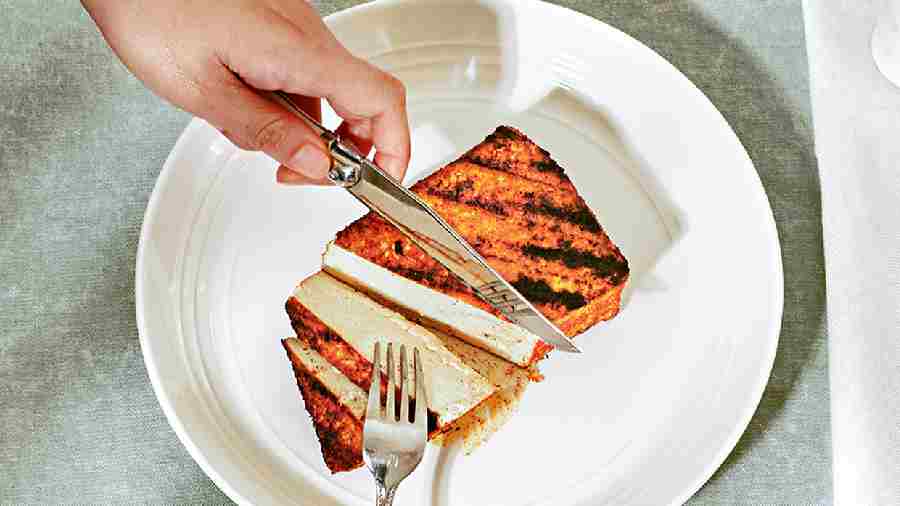A three-ounce serving of tofu can provide between 4 and 14 grams of protein (depending on the style), including all nine of the essential amino acids. It also supplies B vitamins, healthy unsaturated fatty acids and minerals like calcium, magnesium, zinc and iron, said Amy Bragagnini, dietitian and spokesperson for the Academy of Nutrition and Dietetics in the US.
Yet, soy foods are also burdened by an unsavory reputation. Bragagnini’s clients, for instance, routinely ask if soy foods are linked with cancer, a concern stemming from their relatively high levels of isoflavones, plant-based compounds that are structurally similar to the hormone estrogen.
The presence of isoflavones has also led to the worry that soy might negatively affect fertility or give men more feminine characteristics.
But overall, studies have shown that including soy foods in your diet is not only safe, it may also benefit your heart and metabolic health, said Qi Sun, an associate professor of nutrition and epidemiology at the Harvard T.H. Chan School of Public Health in the US.
While it’s true that the isoflavones in soy can weakly mimic estrogen, they also seem to have anti-cancer, anti-inflammatory and antioxidant properties. Here’s what we know.
Cancer
One historical worry about soy has been that its estrogen-like isoflavones might promote breast cancer, but many studies have shown that women who eat higher amounts of soy foods have no greater risk — or even a lower risk — of developing breast cancer than those who eat little or no soy, said Xiao-Ou Shu, a professor of epidemiology at the Vanderbilt University School of Medicine in the US.
The protective association is strongest in studies conducted in Asian countries, she noted, where soy is commonly consumed from infancy to old age.
In a study published in 2012, Shu and her colleagues found that among women in China and the US who had been diagnosed with breast cancer, those who ate about half a serving or more of soy foods per day after their diagnoses were less likely to have a recurrence than those who ate smaller amounts.
Fertility and menopause
The concern that soy might interfere with fertility — including by affecting sperm count or quality, the ability to conceive, or testosterone or estrogen levels in men — has also not held up to the evidence, Sun said.
Some small studies have found that soy can modestly reduce menopause-related hot flashes, but these results have been mixed, Bragagnini said. Still, she added, if you’re dealing with these symptoms, “it can’t hurt to add a serving or two a day” of whole soy foods to see if they help.
Some research has also found that greater soy intake is associated with a lower risk of osteoporotic fractures in postmenopausal women.
Heart health
There’s some evidence that including soy in your diet can benefit your heart, Sun said.
He led a study published in 2020 that found that consuming more soy isoflavones, particularly from tofu, was associated with a moderately lower risk of coronary heart disease.
In another study, of nearly 1,20,000 healthcare professionals in the US, Sun and his colleagues found that during the more than 30 years of follow-up, those who consumed at least one serving of tofu or soy milk per week were 15 per cent to 16 per cent less likely to die than those who ate less than one serving of tofu per month.
“It’s almost a no-brainer that people should choose tofu and other plant-based proteins instead of animal source proteins”, particularly those from processed and red meats, which are associated with a higher risk of heart disease, diabetes, colorectal cancer and earlier death, Sun said.
And, he added, eating more plant-based foods can “not only improve human health, but also improve the health of the globe,” because protein sources such as soy, beans, peas and nuts have much lower greenhouse gas footprints than meat, cheese or eggs.
Incorporate soy in diet
As a dietitian, Bragagnini has found that tofu is sometimes a hard sell when she recommends it to clients. “They just roll their eyes,” she said, “but they’ve never really even tried it.”
Tofu and tempeh, which is made from fermented soybeans, take on virtually any flavour profile and can be baked, sautéed, simmered in a sauce or, Bragagnini’s favourite, crisped in an air fryer.
And if those blocks of soy protein just aren’t your jam, she suggested snacking on soy nuts, steaming some edamame or making smoothies with unsweetened soy milk. Bragagnini encourages people to include one or two servings of soy foods in their daily diet.
But she cautioned against using isoflavone supplements, which can contain far greater amounts of the compounds than are found in foods. And, as with all supplements, they are not well regulated by the Food and Drug Administration. “If a little is good, a lot is not necessarily better,” she said.
NYTNS











